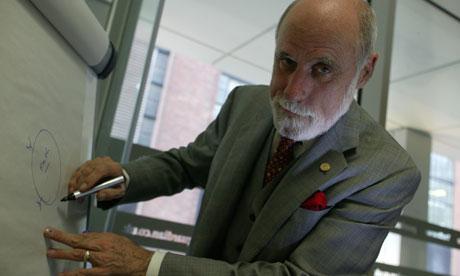The Internet, Human Rights, and the Desperate Need for Humanists

Is the Internet a Human Right?
No.
At least not according to Vint Cerf, so-called “father of the internet”, who argued as much in a recent New York Times op-ed piece published last week. The essay was largely in response to a United Nations report that declared that the Internet had “become an indispensable tool for realizing a range of human rights.”
In typical Internet fashion, the title of Cerf’s article is inflammatory and almost trollish, but the argument itself is much less controversial. “Technology is an enabler of rights, not a right itself”: this is the real kernel of Cerf’s largely philosophical argument. He argues his claim with an interesting analogy in which he compares what the Internet is to the right of free expression to what the horse was to the right to earn a living:
For example, at one time if you didn’t have a horse it was hard to make a living. But the important right in that case was the right to make a living, not the right to a horse. Today, if I were granted a right to have a horse, I’m not sure where I would put it.
Fair enough. But as Devin Coldewey of TechCrunch pointed out:
The topic is difficult to address, not because its naturally inflammatory, but because it is difficult to pin down what exactly is meant by “right,” and what is meant by “internet.” Without definition terms, any assertion is meaningless.
Cerf never actually defines either of these words, but it is clear from the horse comparison that he sees internet as a tool, an enabler, an end towards a larger goal: "Internet access is always just a tool for obtaining something else more important," he says, and much of the blogosphere agrees with him. The Internet might just be a bigger, faster, telephone:
While the United States has never decreed that everyone has a "right" to a telephone, we have come close to this with the notion of "universal service" -- the idea that telephone service (and electricity, and now broadband Internet) must be available even in the most remote regions of the country. When we accept this idea, we are edging into the idea of Internet access as a civil right, because ensuring access is a policy made by the government.
Cerf’s piece has not been without its challenges. For instance, Amnesty International's USA blog argues that Cerf provides an "exceptionally narrow portrayal of human rights from a legal and philosophical perspective". Moreover, his means versus ends characterization of rights is philosophically incoherent, for:
while access to the physical town square may not be a human right in isolation, it has always been for most inseparable from the right to association and expression.
A blogger as Techi agrees:
Technology is an enabler as Cerf states. In many cases, it’s also a right; the two statuses are not mutually exclusive… Downplaying the importance and amazing abilities of the internet to improve the human condition is dangerous
Indeed the analytic distinction between ends and means has always been problematic in the discussion of rights. As Dr. Nathanial Borenstin correctly points out:
Among the most widely recognized human rights are clothing and shelter, which are among the most fundamental of human technologies. It is true that some rights are more abstract, but many are not. The US Bill of Rights guarantees freedom of the press and the right to bear arms; technology is fundamental to both of those rights.
We could go even further, arguing that many “rights” we take as valuable in their own right were historically conceived as means, not ends, towards the achievement of greater values. Few would doubt today that freedom of expression is a “right” by itself. But philosophers and humanists could easily point out that early advocates of free speech, such as John Stewart Mill, outlined the benefits of “searching for a discovering truth” as a way to further knowledge, to discover Truth, to better representative government, and to realize personal growth and self-realization. Freedom of expression was, in essence, a tool, a means or enabler, of these grander ends.
Furthermore, many of the challengers of Cerf’s argument take for granted that the Internet should be analyzed as a tool, and simply disagree with the presumed relationship between ends and means. But how else could we conceive of the Internet? How would Cerf’s logic change has he conceived the Internet not as a wrench-like device but as a space, a history, a story, a community, or an environment in which political struggle takes place?
Reading these commentaries, it is clear to me that humanists and philosophers of science and technology are urgently needed in this debate. The current division of labor – engineers in charge of technology, humanists in charge of values – is not adequate. Cerf, for his own right, acknowledges this, and places more responsibility on engineers “empower uses”, “create and maintain these new capabilities” and develop the Internet in ways that “improve the human condition”. But if engineers are integrated into the rights debate, humanists need to do their part. With their input, we will hopefully gain more insight not only into the question, “what is a right?” but also, “what is the internet?”